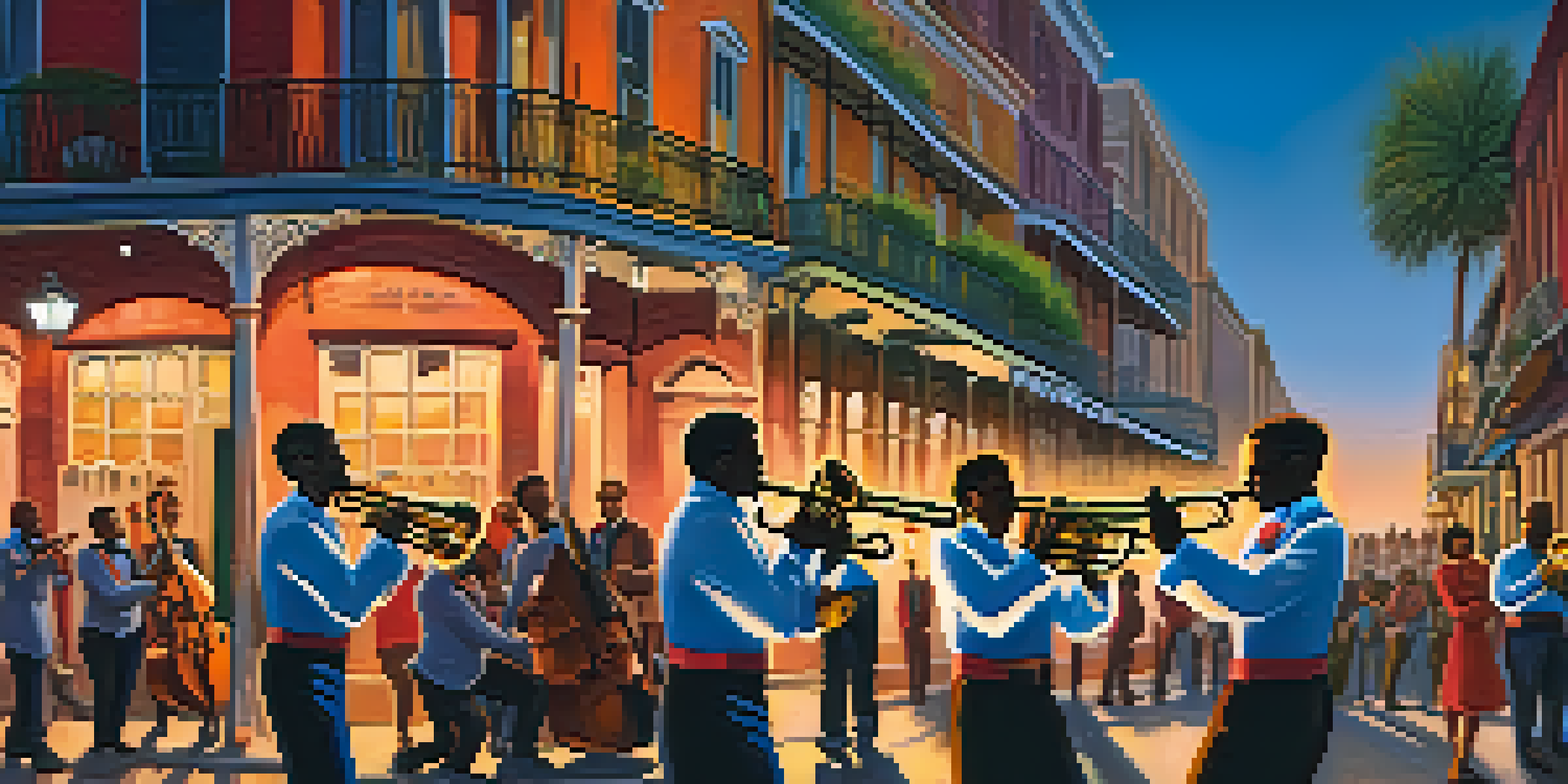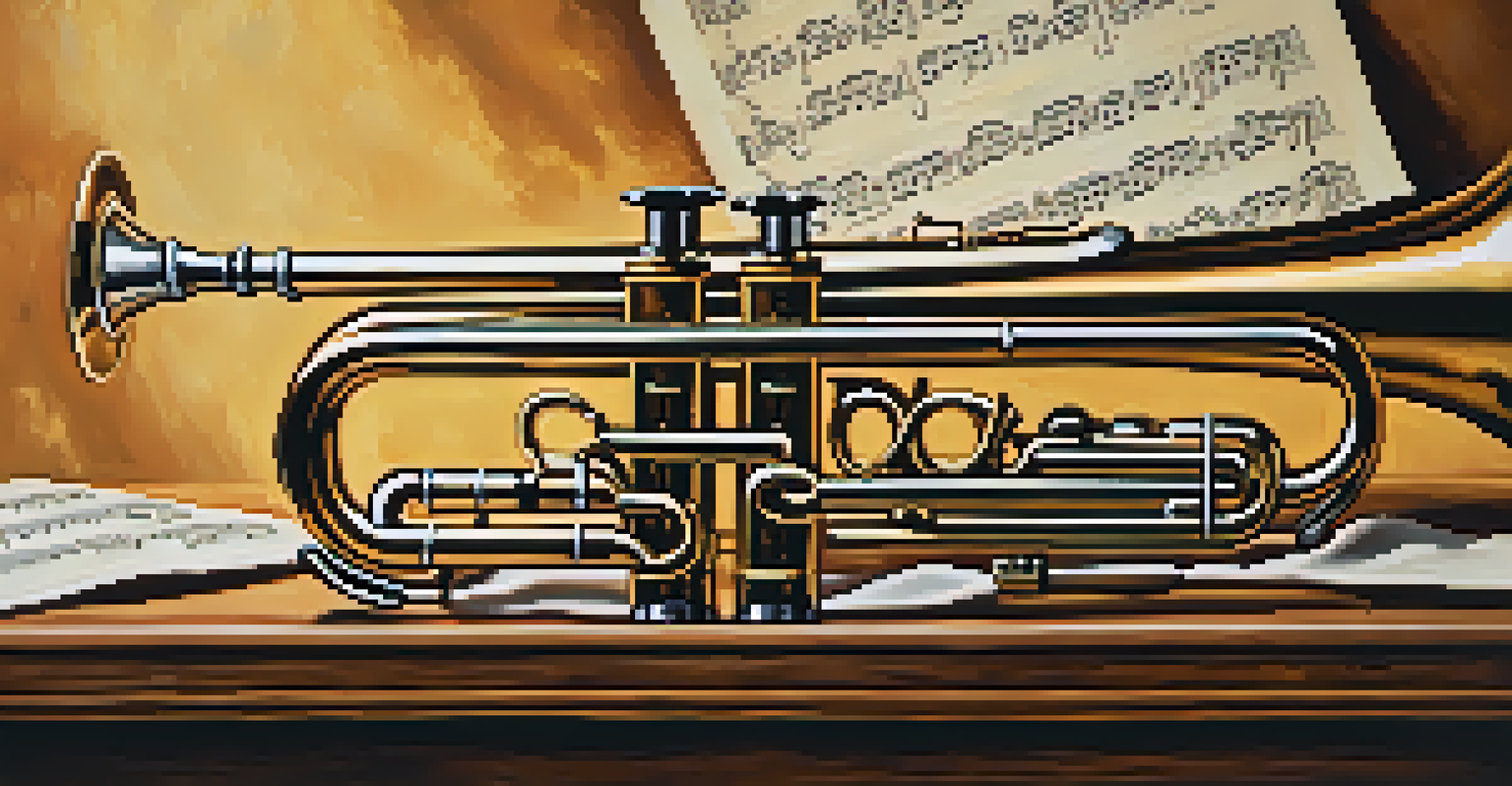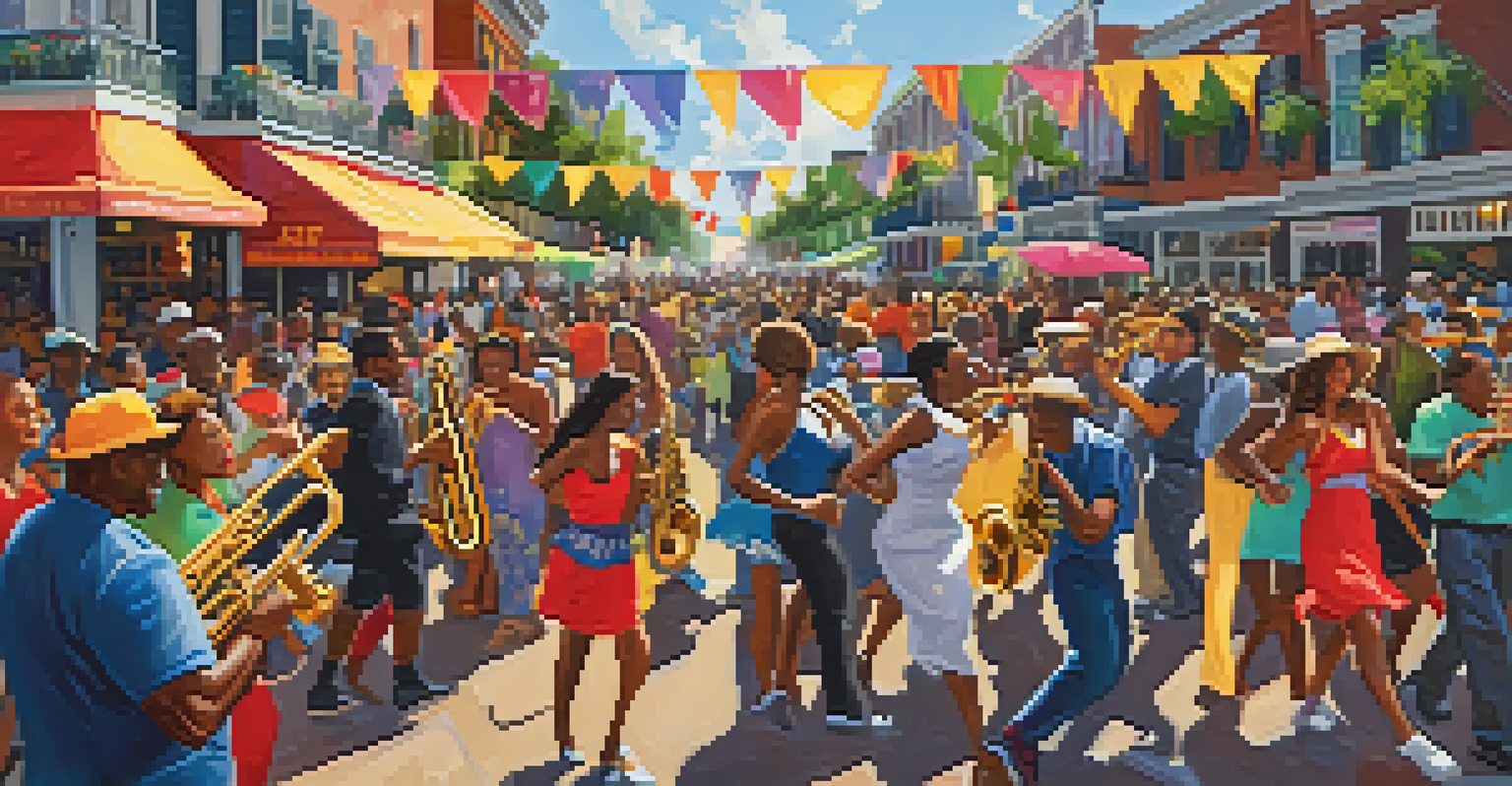Iconic Jazz Musicians from New Orleans Who Shaped the Genre

Louis Armstrong: The Ambassador of Jazz
Louis Armstrong, often called 'Satchmo,' is perhaps the most iconic figure in jazz history. Born in New Orleans in 1901, his unique trumpet style and gravelly voice revolutionized the genre, making it accessible to a wider audience. Armstrong's improvisational skills not only showcased his talent but also set a standard for future jazz musicians.
If you have to ask what jazz is, you'll never know.
His infectious energy and charisma on stage helped popularize jazz across the globe. Songs like 'What a Wonderful World' and 'Hello, Dolly!' are just a few examples of his lasting impact, illustrating how he could blend emotion with musicality. Armstrong’s life story, from a humble upbringing to international stardom, reflects the transformative power of jazz.
Armstrong’s influence extends beyond music; he broke racial barriers and served as a cultural ambassador for jazz. His ability to connect with audiences, regardless of their background, is a testament to the universal language of music. Today, his legacy lives on, inspiring countless musicians and fans around the world.
Ella Fitzgerald: The First Lady of Song
Ella Fitzgerald, born in 1917, is celebrated as one of the greatest jazz vocalists of all time. Her incredible range and ability to improvise with scat singing captivated audiences and made her a standout performer. Fitzgerald's career began in New Orleans, where she honed her craft and developed her distinctive style.

Over the decades, she collaborated with many jazz legends, including Louis Armstrong and Duke Ellington, creating timeless classics that resonate even today. Her interpretation of songs like 'Summertime' and 'Dream a Little Dream of Me' showcases her emotional depth and technical prowess. Fitzgerald’s voice is often described as pure and effortless, a quality that draws listeners in.
Jazz's Roots in New Orleans
New Orleans has been the birthplace of jazz, producing legendary musicians like Louis Armstrong and Buddy Bolden who shaped the genre's foundation.
Beyond her musical achievements, Fitzgerald broke barriers for African American artists in a segregated America. She used her platform to advocate for civil rights and inspire future generations of musicians. Her legacy is a blend of artistic excellence and social impact, making her a true icon in the jazz world.
Duke Ellington: The Innovator of Jazz Composition
Duke Ellington, born in 1899, was a composer, pianist, and bandleader who transformed jazz into an art form. His innovative approach to composition blended various styles, creating sophisticated arrangements that captivated audiences. Ellington's orchestra was a training ground for many talented musicians, further enriching the jazz scene in New Orleans and beyond.
The only thing better than singing is more singing.
One of his most famous works, 'Mood Indigo,' exemplifies his ability to evoke emotion through music. Ellington's compositions often featured complex harmonies and rich textures, showcasing the depth of jazz beyond simple melodies. His vision helped elevate jazz to the concert stage, allowing it to be appreciated as serious music.
Ellington's career spanned over five decades, during which he received numerous awards and accolades. He was not just a musician; he was a cultural ambassador who showcased the beauty of jazz to the world. His legacy lives on through his timeless music and the many artists he inspired along the way.
Buddy Bolden: The Father of Jazz
Buddy Bolden, often hailed as the 'father of jazz,' was a cornet player whose influence laid the groundwork for the genre. Though his career was relatively short-lived, his innovative style and powerful sound made a lasting impression on the New Orleans music scene. Bolden's improvisational skills and energetic performances set the stage for future jazz musicians.
He played in various brass bands and was known for his ability to blend blues with ragtime, creating a unique sound that captivated audiences. Unfortunately, Bolden's life was marred by struggles with mental health, leading to his eventual institutionalization. Despite this, his impact on jazz is undeniable and continues to inspire musicians today.
Cultural Impact of Jazz
Jazz serves as a powerful cultural expression that reflects the struggles and triumphs of its creators, breaking barriers and promoting unity.
Though there are no recordings of his music, stories of his performances have been passed down through generations. Bolden's legacy serves as a reminder of the raw, emotional power of jazz and its roots in New Orleans. His story is a testament to the enduring spirit of creativity and the transformative nature of music.
King Oliver: The Mentor of Louis Armstrong
King Oliver was a cornet player and bandleader who played a pivotal role in the early jazz scene of New Orleans. Born in 1885, his innovative use of mutes and strong ensemble playing set him apart from his contemporaries. Oliver was not only a talented musician but also an important mentor to Louis Armstrong, helping to shape the future of jazz.
His Creole Jazz Band was one of the first African American bands to gain national recognition, showcasing the talent coming out of New Orleans. With hits like 'Dipper Mouth Blues,' Oliver's music combined traditional jazz elements with a new, vibrant energy. His ability to blend different musical styles helped pave the way for the jazz evolution.
Despite the challenges he faced in the music industry, Oliver's influence extended far beyond his lifetime. His mentorship of Armstrong and other musicians created a legacy that continues to resonate within the jazz community. Today, King Oliver is remembered as a trailblazer who helped define the sound of jazz.
Wynton Marsalis: The Modern Jazz Ambassador
Wynton Marsalis, born in 1961, is a contemporary jazz musician who has made significant contributions to the genre. As a trumpeter, composer, and bandleader, Marsalis has worked tirelessly to preserve the traditions of jazz while also pushing its boundaries. His deep connection to New Orleans music is evident in his compositions and performances.
Marsalis has received numerous awards, including multiple Grammy Awards and the prestigious Pulitzer Prize for Music. His work with the Lincoln Center Jazz Orchestra has helped bring jazz back to its roots, emphasizing the importance of live performance and improvisation. He is known for his ability to educate audiences about the history and significance of jazz.
Legacy of Influence and Innovation
The legacy of jazz continues through modern ambassadors like Wynton Marsalis, who preserve traditions while inspiring new generations of musicians.
Beyond his musical achievements, Marsalis is an advocate for cultural preservation and arts education. He believes in the power of music to unite people and inspire change. His dedication to jazz and its heritage continues to influence new generations of musicians, ensuring that the spirit of New Orleans jazz lives on.
Dr. John: The Spirit of New Orleans
Dr. John, born Malcolm John Rebennack Jr. in 1941, is a legendary musician known for his fusion of jazz, blues, and rock. Emerging from the vibrant music scene of New Orleans, his unique style and charismatic persona have made him a beloved figure in the music world. Dr. John's music often reflects the rich cultural heritage of New Orleans, showcasing the city's soulful spirit.
His most famous album, 'Gris-Gris,' features an eclectic mix of styles, blending traditional New Orleans rhythms with funk and psychedelic elements. Dr. John's piano skills and distinctive voice create a captivating listening experience. He has collaborated with numerous artists, further enriching the jazz landscape with his innovative approach.

As a performer, Dr. John embodies the essence of New Orleans music, captivating audiences with his storytelling and infectious energy. His contributions to jazz and the broader music community have earned him a place in the hearts of fans worldwide. Dr. John's legacy is a celebration of the diverse sounds that define New Orleans jazz.
Conclusion: The Enduring Legacy of New Orleans Jazz
The impact of New Orleans on the jazz genre is immeasurable, with countless musicians contributing to its rich tapestry. From the early pioneers like Louis Armstrong and Buddy Bolden to modern ambassadors like Wynton Marsalis, each artist has added their unique voice to the conversation. This vibrant city continues to inspire and nurture musical talent, ensuring that jazz remains a living, breathing art form.
Jazz is more than just music; it's a cultural expression that reflects the struggles and triumphs of its creators. The stories of these iconic musicians remind us of the power of creativity and the importance of preserving our musical heritage. As we celebrate their legacies, we also look forward to the future of jazz, where new voices will continue to emerge.
In essence, New Orleans jazz is a testament to the city's spirit and resilience. Its legacy will forever be intertwined with the history of music, echoing through the streets and venues where it all began. As we listen to the sounds of jazz, we are reminded of its roots and the incredible artists who shaped its course.